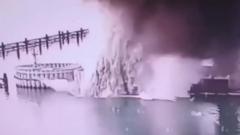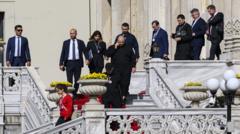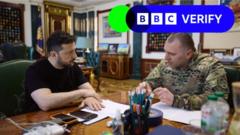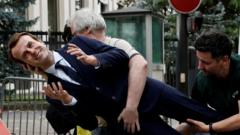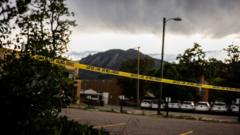General Carsten Breuer of Germany has emphasized the growing threat from Russia towards NATO member states, predicting that Russia could launch an attack by 2029. He argued for a robust military response and unification within NATO to deter potential aggression, despite varying perspectives among member states.
German Defence Chief Signals Increased Risk of Russian Attack on NATO
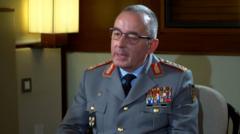
German Defence Chief Signals Increased Risk of Russian Attack on NATO
Germany's top military officer warns NATO of a potential Russian assault within the next four years, highlighting an urgent need for enhanced military readiness in light of Moscow’s continuous military buildup.
Germany's chief of defence, General Carsten Breuer, has issued a stark warning regarding the possibility of a Russian attack on NATO within the next four years, following substantial military buildup by Russia. Speaking at the Shangri-la Dialogue in Singapore, he noted that Russia is producing a staggering 1,500 main battle tanks annually, which could be used against the NATO Baltic states by 2029 or potentially sooner.
Breuer described the ongoing threat as “very serious,” asserting that he has not encountered such a risk during his 40 years of military service. He emphasized that while not all tanks produced are deployed in Ukraine, they contribute to an escalating arsenal aimed at confronting the West. Additionally, he cited the production of four million rounds of artillery munition in 2024, with much of it also not directed to the war in Ukraine, suggesting that it is being stockpiled for future conflicts.
Ahead of an upcoming NATO summit in The Hague, Breuer called for immediate action to bolster NATO's defenses. He identified strategic regions such as the Suwalki Gap—a critical passage between Poland and Lithuania revered for its vulnerability—where the proximity to Russia raises concerns.
“The Baltic States are really exposed to the Russians," he pointed out, reflecting on the varying perceptions of threat among European nations. Breuer provided an analogy from Estonian officials likening their situation to being "close to a wildfire," contrasting it with a more distanced view held by nations like Germany.
The general articulated how Russia perceives the war in Ukraine as a part of a broader confrontation with NATO, which influences its military strategies. He mentioned recent cyber attacks and incursions, indicating an ongoing testing of NATO's defenses.
In response to these threats, Breuer called on NATO allies to strengthen their military capacities and enhance collective readiness. He was optimistic about NATO's unity despite some discord stemming from Hungary and Slovakia's engagements with Russia, noting a recent rise in solidarity among member states, particularly following Finland and Sweden's decision to join the alliance.
Breuer’s comments highlight a significant shift in Germany's defence posture, reflecting a broader acknowledgment across Western nations of the need to increase military preparedness. However, concerns persist about whether NATO can effectively scale up its capabilities to match Russia’s aggressive remilitarization. The implications of such military escalation could have profound impacts on the geopolitical landscape of Europe and beyond, raising questions about the balance of power between NATO and Russia.




